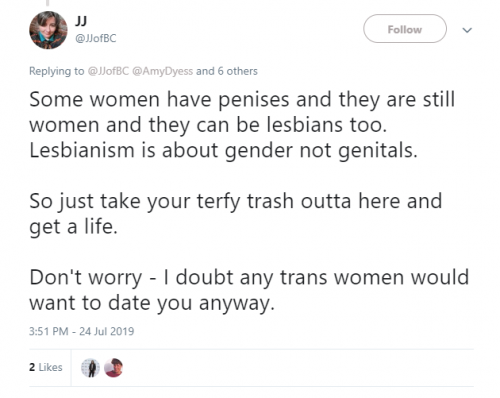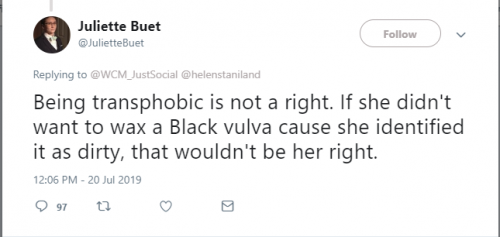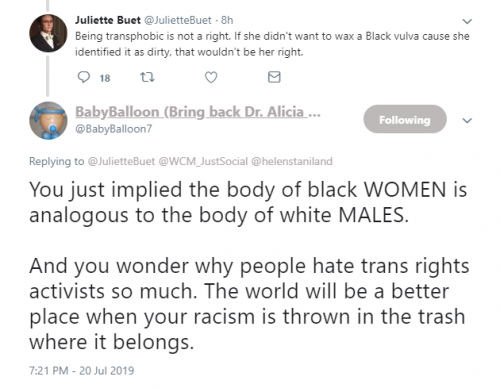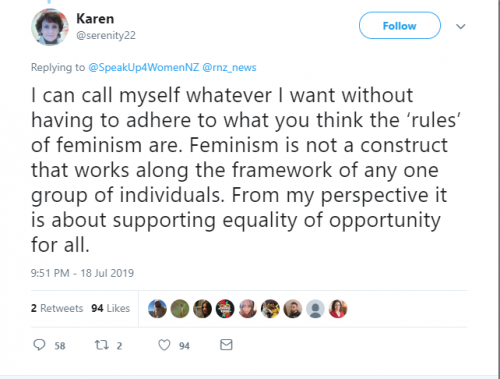In the last essay, I described the article that finally got me interested enough in Judith Butler to actually read Gender Trouble. I had read a lot about Butler’s writings, filtered through radical feminist interpretations, and they had not inspired me to explore the original.
For one thing, I never see anyone quote or discuss Butler except radical feminists and a few philosophers who hate her. Of course, I don’t follow the social media or blog accounts of the tribe that espouses gender ideology, but I do run across comments from the tribe on Twitter – it’s impossible not to. They say: “Trans women are women, end of discussion.” “Biological sex is a social construct.” “Our identity is not up for debate.” “Shut up Terf!” “My pronouns are xe/xur.” “Misgendering is violence.” “Objecting to the label cis is transphobia.” “Non-binary people exist.” “The penis is a female organ.” “Suck my formaldehyde pickled balls.” Leaving aside the truth or falsehood of these assertions, none of this sounds very theoretical or academic. And unlike radical feminists, these commenters don’t link to academic articles or thoughtful essays on blogposts, despite exhortations to “educate yourself.” I have a hard time believing any of these people have read Butler.

I’ve also read a good deal of media propaganda about the “gender revolution,” from places like National Geographic, The Guardian, The New York Times, and the BBC, to name a few. Butler’s name is occasionally dropped, as a historical precedent or an inspiration to the genderfull, but the discussion quickly moves on. I doubt many of these journalists have read Butler either.
Having been a college student myself, I also find it hard to believe that many college grads have read Butler. Oh, I believe Gender Trouble was assigned. I believe it was discussed in a class or two. I believe many graduates can regurgitate a succinct summation of the theme, the way so many white quasi-feminists can spout a rehearsed definition of intersectionality without having any idea what it means. But come on, if any of the people who bought Gender Trouble at the beginning of a college term ever read past page two, those troubling words are decomposing in their brains along with calculus theorems they hope never to use again.
I have made the assumption (unconscious, as most assumptions are) that radfems have been perusing Gender Trouble carefully searching for a theoretical basis for the current gender madness that is undermining feminist progress (and even hard-won rights). I have assumed that they have done this because radical feminists are theoretically-minded women, who ground their own positions and actions in careful analysis, not because Gender Trouble has inspired bizarre permutations of patriarchy like the Cotton Ceiling. In short, I assumed radfems were reading Gender Trouble because of who they are, not because of what that book is, thereby giving it a significance it doesn’t deserve.
I further assumed that this agenda of finding a theoretical basis for contemporary women’s oppression has led radfems to misread Butler. I assumed that by careful reading they found somewhere, perhaps on page 53, something that implied that sex (female biology) is fundamentally a suspect social construct, and later, perhaps on page 97, something that implied “woman” should be deconstructed into an individual identifier unconstrained by common definition. But surely she didn’t mean to erase women altogether. It had to be a misreading, because who would seriously say that, besides some nut on Tumblr?
The final assumption I must confess (the last one, I promise) is my assumption that my poor brain wasn’t up to the job of reading Butler. Not that I consider myself an idiot, but I’m trained in economics and social work, not philosophy. And I kept hearing from radfems that Butler was “difficult,” “impenetrable,” “hard to understand.” I now think that they were only being kind.
Because the first thing I realized, reading the preface of Gender Trouble, is that Judith Butler is not in my league. After ten years in psychiatric social work practice, I know the difference between someone communicating a difficult concept and someone who has difficulty communicating. I know better than to strain to grasp the point of a writer jumping from place to place to place, because I know she, too, is struggling to find her point. I know that convoluted writing reflects confused thinking as much as poor writing skills, and I don’t think Butler’s primary problem is that she can’t write. Butler’s convoluted, disjointed, disorganized, unfocused thoughts are a desecration to the printed page, and had she come up with any “theory” except one so damaging to feminism, no one would take her seriously. Thus my first apology is to myself, for thinking I could not understand Butler. I understand her too well.
My second apology is to my fellow radfems, for assuming they were erroneously ascribing to Butler the intentional unmooring the word “woman” from any definition. That is unquestionably her aim, stated on the first page and continuing for as long as I could read. She doesn’t say it clearly, because she doesn’t say anything clearly, but she does say it.
The very subject of women is no longer understood in stable or abiding terms. There is a great deal of material that not only questions the viability of “the subject” as the ultimate candidate for representation, or, indeed, liberation, but there is very little agreement after all on what it is that constitutes, or ought to constitute, the category of women. (p. 1)
Yes, that’s what she wrote. Don’t go back and read it again. I carefully proofed this excerpt, and the grammatical error in the second sentence is either a typo or Butler’s unique way of phrasing things, free from the constraints of heteronormative grammar. As for the “great deal of material,” supporting this contention, it isn’t cited, so I’m unsure whether this material is feminist, or about women, or related to “the viability of ‘the subject’” in more general postmodern theory. If I had read to the end, perhaps I would know (but I doubt it).
Having moved women beyond any clear definition, Butler moves on to the biology of the female.
If the immutable character of sex is contested, perhaps this construct called “sex” is as culturally constructed as gender; indeed, perhaps it was always already gender, with the consequence that the distinction between sex and gender turns out to be no distinction at all. (p.9)
If the immutable character of sex is contested. That’s a big “if,” unsupported by the previous paragraph, requiring a consultation with the footnotes. Let’s see. She cites herself, which might count if she was a biologist, but she’s not, and a quantum physicist who sounds interesting but she’s also not a biologist. Quantum physics challenges our basic notions of reality, but it doesn’t negate biology, as any physics teacher will tell you. Okay, moving down to the next note, an African-American historian, a professor of American Studies, and an anthropologist are given credit for thinking some of Butler’s ideas before she did. I wonder how that feels. Then more Butler citing herself. Then there’s this gem:
Of course, Homi Bhabha’s work on the mimetic splitting of the postcolonial subject is close to my own in several ways: not only the appropriation of the colonial “voice” by the colonized, but the split condition of identification are crucial to a notion of performativity that emphasizes the way minority identities are produced and riven at the same time under conditions of domination.
Again, this was carefully proofed: it’s a classic example of a misuse of a colon. Don’t reread: it was wrong the first time.
Okay, I’m not going to subject myself, let along you, dear reader, to any more Butler footnotes. I’ll give one more example of Butler conflating sex with gender and erasing woman as a category, just to complete my mea culpa.
[Simone de] Beauvoir is clear that one “becomes” a woman, but always under the cultural compulsion to become one. And clearly the compulsion does not come from “sex.” There is nothing in her account that guarantees that the “one” who becomes a woman is necessarily female. If “the body is a situation,” as she claims, there is no recourse to a body that has not always already been interpreted by cultural meanings; hence, sex could not could not qualify as a prediscursive anatomical facticity. Indeed, sex, by definition, will be shown to have been gender all along. (p.11)
A couple of things. There is a dichotomy in that excerpt. Even though The Second Sex is about the condition of women, Butler states that we can theoretically imagine that nothing de Beauvoir says guarantees that the “one” who becomes a woman is necessarily female; but in the next sentence we are forbidden from supposition.. “…there is no recourse to a body that has not always already been interpreted by cultural meanings; hence, sex could not could not qualify as a prediscursive anatomical facticity. This is an example of what I was talking about in part one: Butler can’t seem to hold a premise from one sentence to the next, or else there’s some connection between the two statements left out. There’s also a logical fallacy in that second statement. All sexed bodies are influenced by culture; hence there is no sexed body that culture influences. I won’t critique Butler on that level, however, because postmodern theory (when convenient) says there is no a priori condition and cause-and-effect are simultaneous. Still, if we can imagine de Beauvoir was talking about dicks (and it’s a stretch), we can imagine, just for a moment, a world that is subject to cause-and-effect (which, as a matter of fact, ours happens to be). Some radical feminists accuse Butler of sleight-of-hand and intellectual dishonesty. The impression I’m getting is that she is not dishonest but incompetent.
The second comment I want to make about that excerpt involves another apology, this time to French feminists. As an American feminist, I am so sorry about this woman. I don’t know how we produced her, and she claims it was the French. She quotes the translation of that opening line to The Second Sex in Gender Trouble and makes it carry a heavy load, and in the article in The New Stateman I mentioned in part one, she’s still taking that sentence apart. It shouldn’t need to be said, but I have to say it. De Beauvoir did not write, “One is not born, but rather becomes, a woman.” She wrote, On ne nait pas femme: on le deviant. Maybe that phrase translates perfectly in the English edition, but not everybody thinks it does, and at any rate a discussion of the meaning of the words and their connotation in their original language is warranted before imbuing them with a meaning that could not have been imagined at the time they were written.
In her 1999 preface, Butler also misrepresents Catherine MacKinnon’s arguments concerning gender hierarchy:
If gender hierarchy produces and consolidates gender, and if gender hierarchy presupposes an operative notion of gender, then gender is what causes gender, and the formulation culminates in tautology. (p. xiii)
Butler is aware, or should be aware, that MacKinnon is operating under a recognition of the material differences between men and women. Male and female is not a tautology, and MacKinnon is decidedly not a postmodernist. Not being versed in many of the theorists Butler cites in support of her assertions (and being reluctant to revisit Freud), I cannot say if she characteristically misrepresents them. I will say, however, that analysis that habitually misrepresents the work of others reflects dishonesty, laziness, or fuzzy thinking. (I vote for the latter.)


Moving on to another erroneous assumption I made about Gender Trouble, radfems are right to attribute at least some of the gender ideology eroding women’s rights to Butler. I won’t go into exhaustive detail on this, but I recognize phrases and jargon commonly invoked by gender warriors in this book. To give just one example: I can’t count the number of times I’ve heard a trans woman assert that because black women with female anatomy can be women, anybody with a penis can also be a woman. Butler says:
The contemporary feminist debates over essentialism raise the question of the universality of female identity and masculinist oppression in other ways. Universalistic claims are based on a common or shared epistemological standpoint, understood as the articulated consciousness or shared structures of oppression or in the ostensibly transcultural structures of femininity, maternity, sexuality, and/or ecriture feminine. The opening discussion in this chapter argued that this globalizing gesture has spawned a number of criticisms from women who claim that the category of “women” is normative and exclusionary and is invoked with the unmarked dimensions of class and racial privilege intact. In other words, the insistence upon the coherence and unity of the category of women has effectively refused the multiplicity of cultural, social, and political intersections in which the concrete array of “women” are constructed. (p. 19, emphasis added)
Butler does not state the concept in such racist terms as my Twitter friends (nor do I believe she meant to invoke such a baldly racist statement), but she is saying that a woman can either mean a white, middle-class, straight, able-bodied, biological woman, or it can be dissolved as a defined category altogether. In order to include brown skin, we must include dicks.
Another popular idea that can be traced to Butler is that feminism should be about all people, rather than focused on women. In fact, Butler says feminism re-creates the oppression of women by sustaining “women” as a linguistic category.
Feminist critique ought also to understand how the category of “women,” the subject of feminism, is produced and restrained by the very structures of power through which emancipation is sought.
Indeed, the question of women as the subject of feminism raises the possibility that there may not be a subject who stands “before” the law, awaiting representation in or by the law. Perhaps the subject, as well as the invocation of a temporal “before,” is constituted by the law as the fictive foundation of its own claim to legitimacy. (p. 4)

There is nothing supporting this claim, other than to cite the work of the great man Michel Foucault. There is an almost Biblical paradigm operating here: don’t prove a point, point to an authority. I am struck by the lack of concrete real-world examples that I find in Gender Trouble, because I’m used to seeing them in the feminist theory that I have studied. One example I kept thinking of as I read this book, is the lawsuit against Poverello House in Fresno, California. The nine women suing the homeless shelter say they were subjected to sexual harassment typical of males from a resident housed there, and that this resident was a man falsely claiming to be transgender to access segregated living space. Yet the assertion of gender ideologists that there should be no defined categories of gender precludes a falsification of gender identity. The postmodern theory underpinning gender ideology, with its emphasis on linguistic subversion and individual rebellion against sexual norms, has no room for the class analysis that would identify remedies for as highly marginalized and vulnerable a group as homeless women. Ramifications such as the Poverello scenario to gender ideology were pointed out by feminists years before they occurred, because people who can think can understand, at least sometimes, the implications of a theory. Some feminists assert that Butler lacks empathy for women in harsh socioeconomic circumstances, while Butler asserts that she is detached and nonprescriptive in her realm of theory. I think there’s a cog missing in this woman’s brain.
Have I answered my initial question yet? I can’t take this woman seriously as any kind of theorist, though I can understand how she could have an appeal to sexist university officials, sexist gay males, sexist liberal philanthropists, and sexist medical doctors. She’s having trouble reaching sexist religious conservatives, though, which I guess is what that dizzying rant in The New Statesmen was about. I’m not interested in refuting her assertions, because other feminists have done an excellent job. What I set out to explore was whether she potentially has anything to bring to the table, and I found no reason to hope. I do have other questions, such as why Routledge ever published this book. It’s so poorly written, it’s unpublishable in my opinion. Poorly written theory, like any other theory, appeals to people who can find a use for it, but it magnifies the risk, inherent in all written theory, of allowing any agenda to be projected onto it. These suspect agendas then become onerous to dissect and counter, because the original theory is so inscrutable.
I’m going to have to return Gender Trouble to interlibrary loan soon, and in some ways I’m sorry to see it go. I’ve actually learned a few “things” from Butler, such as to be “careful” about putting individual “words” in “quotations.” It can make you “sound” like you’re trying to make the “things” in quotations “disappear.” I’ve started reading pages at random, since it’s poorly organized anyway, and it’s kind of a hoot. I’ll close with a passage selected entirely at random.
By restricting the paternal law to a prohibitive or repressive function, Kristeva fails to understand the paternal mechanisms by which affectivity itself is generated. The law that is said to repress the semiotic may well be the governing principle of the semiotic itself, with the result that what passes as “maternal instinct” may well be a culturally constructed desire which is interpreted through a naturalistic vocabulary.
I rest my case.
